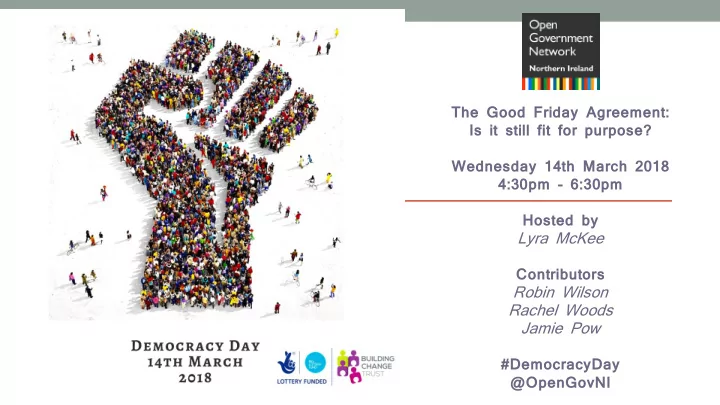

The Good Friday Agreement: Is it still fit for purpose? Wednesday 14th March 2018 4:30pm - 6:30pm Hosted by Lyra McKee Contributors Robin Wilson Rachel Woods Jamie Pow #DemocracyDay @OpenGovNI
IS IT TIME TO REFORM THE GOOD FRIDAY AGREEMENT? Democracy Day, 2018 Jamie Pow, Queen’s University Belfast jpow01@qub.ac.uk
The calls for reform The Belfast Agreement The collapse of power- is often spoken about I think there is a sharing in Northern in quasi-religious need for a cold , Ireland shows the terms. … But its flaws rational look at the Good Friday have become clearer Belfast Agreement. Agreement has over time. outlived its use. Daniel Hannan MEP, Kate Hoey MP, Owen Paterson MP, The Huffington Post , The Daily Telegraph , Twitter, 17 February 19 February 16 February
Reform what? Declaration of Support Rights, Safeguards and 1. 6. Equality of Opportunity Constitutional Issues 2. Decommissioning 7. Strand One: 3. Democratic Institutions in NI Security 8. Strand Two: 4. Policing and Justice 9. North/South Ministerial Council 10. Prisoners Strand Three: 5. British-Irish Council; British-Irish 11. Validation, Implementation and Intergovernmental Conference Review
Reform what? Declaration of Support Rights, Safeguards and 1. 6. Equality of Opportunity Constitutional Issues 2. Decommissioning 7. Strand One: 3. Democratic Institutions in NI Security 8. Strand Two: 4. Policing and Justice 9. North/South Ministerial Council 10. Prisoners Strand Three: 5. British-Irish Council; British-Irish 11. Validation, Implementation and Intergovernmental Conference Review
Why reform? Satisfaction with MLAs’ Performance 80 Dissatisfied 70 60 50 40 30 20 Satisfied 10 0 2007 2008 2009 2010 2012 2013 2014 Are you satisfied or dissatisfied with the way Northern Ireland MLAs are doing their job? Source : NILT (Ark, 2016)
Why reform? Preferred way forward Continue talks about restarting the NI Executive 53.0% and NI Government institutions Joint Authority by the British and Irish 20.6% Governments A Temporary period of Direct Rule (eg 1-2 years) with party talks on future NI Government 19.7% structures Direct Rule - Permanently (for at least 5 years) 6.7% 0.0% 20.0% 40.0% 60.0% Source : LucidTalk (2017)
Why reform? Preferred way forward Feb Feb Sept 2017 Feb 2018 Series2 Series1 Continue talks about restarting the NI Executive 53.0% and NI Government institutions 19.1% Joint Authority by the British and Irish 20.6% Governments 36.6% A Temporary period of Direct Rule (eg 1-2 years) 19.7% with party talks on future NI Government 31.6% structures 6.7% Direct Rule - Permanently (for at least 5 years) 12.7% 0.0% 20.0% 40.0% 60.0% Source : LucidTalk (2017; 2018)
Rethinking consociationalism? Rethink proportional representation in elections? • Plurality-based? • Majoritarian-based? But potential applicability at local government-level?
Rethinking consociationalism? Rethink inclusive coalition after elections? • Voluntary coalition? • Government/opposition dynamic? • Fixed terms? • FM/dFM appointments?
Rethinking consociationalism? Rethink community designation & petitions of concern?
Rethinking consociationalism? Unionist Nationalist Neither 60 50 40 30 20 10 0 Generally speaking, do you think of yourself as a unionist, a nationalist or neither? Source : NILT (Ark, 2018)
Rethinking consociationalism? Rethink community designation & mutual vetoes? • Qualified majority votes? • Defining the scope of the veto? • Subjecting veto to review?
Trade-offs of reform? Consociationalists: in deeply divided societies the choice is “between consociational democracy and no (worthwhile) democracy at all” (O’Leary, 2005: 9). Integrationists: “consociationalism and liberal democracy pull in different directions” (Taylor, 2006: 220). Key question: how rigidly should we stick with consociationalism in its current form? Could its procedures and institutions be reformed without diluting its objectives?
The process of reform Assembly Election Governance has been heavily elite-centric. Turnout (%) 90 85 80 75 70 65 60 55 50 45 40 Source : EONI (2018)
The process of reform Assembly Election Governance has been heavily elite-centric. Turnout (%) 90 GFA Referendum 85 80 75 70 65 60 55 50 45 40 Source : EONI (2018)
Citizen-led reform?
Thank You Any questions?
Recommend
More recommend